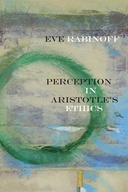Explore

Perception in Aristotle's Ethics seeks to demonstrate that living an ethical life requires a mode of perception that is best called ethical perception. Specifically, drawing primarily on Aristotle’s accounts of perception and ethics in De anima and Nicomachean Ethics, Eve Rabinoff argues that the faculty of perception (aisthesis), which is often thought to be an entirely physical phenomenon, is informed by intellect and has an ethical dimension insofar as it involves the perception of particulars in their ethical significance, as things that are good or bad in themselves and as occasions to act. Further, she contends, virtuous action requires this ethical perception, according to Aristotle, and ethical development consists in the achievement of the harmony of the intellectual and perceptual, rational and nonrational, parts of the soul. Rabinoff's project is philosophically motivated both by the details of Aristotle’s thought and more generally by an increasing philosophical awareness that the ethical agent is an embodied, situated individual, rather than primarily a disembodied, abstract rational will.
This book is included in DOAB.
Why read this book? Have your say.
You must be logged in to comment.
Rights Information
Are you the author or publisher of this work? If so, you can claim it as yours by registering as an Unglue.it rights holder.Downloads
This work has been downloaded 50 times via unglue.it ebook links.
- 50 - pdf (CC BY-NC-ND) at Unglue.it.
Keywords
- Ancient Philosophy
- History of Western philosophy
- Humanities
- Philosophy
- thema EDItEUR::Q Philosophy and Religion::QD Philosophy::QDH Philosophical traditions and schools of thought::QDHA Ancient Greek and Roman philosophy
- Western philosophy: Ancient, to c 500
Editions

